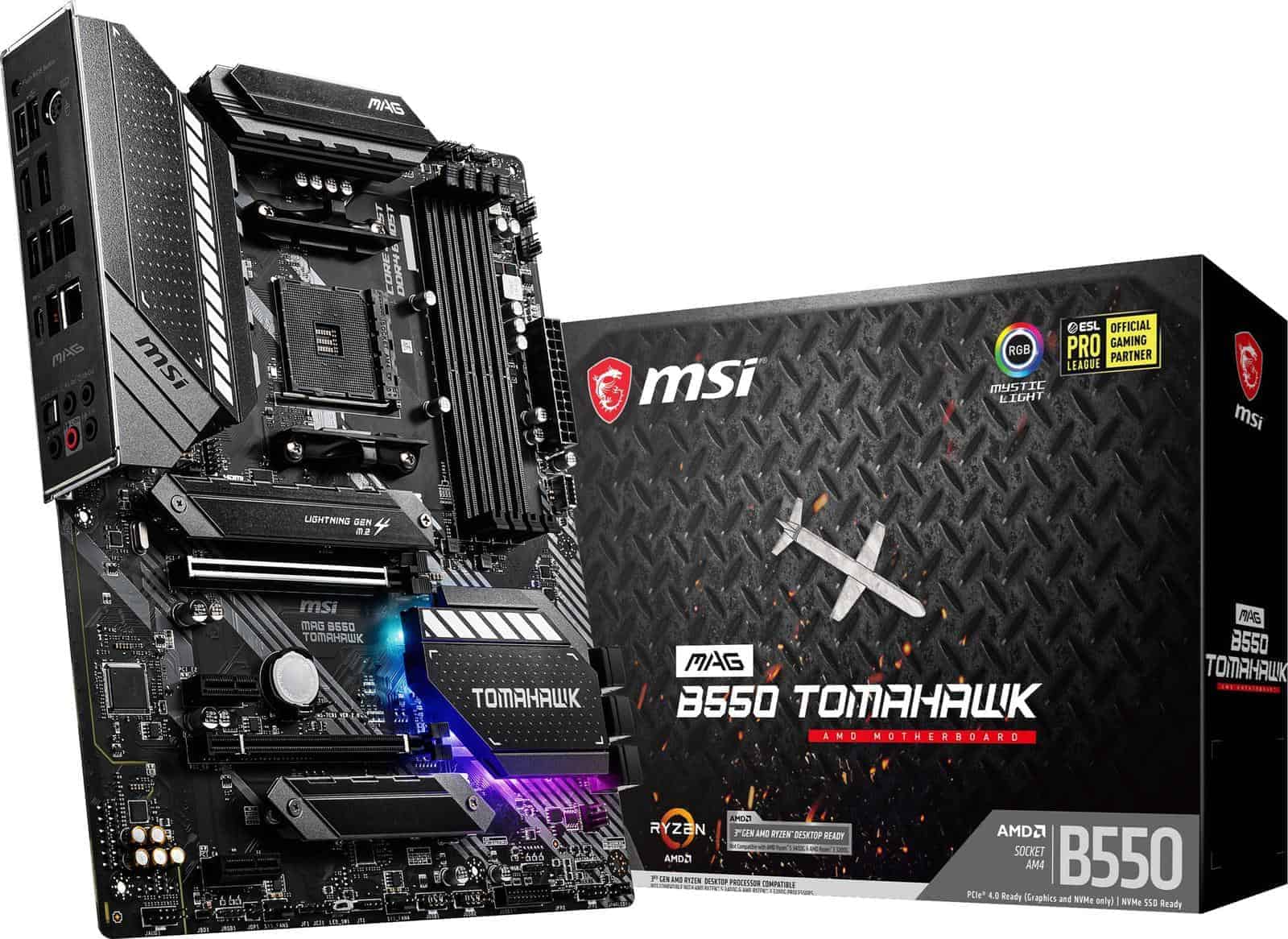When building a PC, choosing the right motherboard is crucial as it serves as the central hub connecting all other parts of the computer. Motherboards come in different sizes and offer various features to meet different needs. It’s important to consider compatibility with CPUs, memory slots, peripheral ports, and additional features when looking for the best motherboard. Some motherboards are optimized for gaming, while others focus on stability and durability for heavy computing tasks. Evaluating these points before purchase ensures that the motherboard matches the intended use and sets the stage for a successful PC build.
There isn’t a single “best” motherboard company for all purposes, but we’ve combined aggregate reviews to crown the best of the best overall categories:
| Rank | Motherboard Company | Strengths |
|---|---|---|
| 1 | Asus | Great all-around performance, good for overclocking, [ROG Strix series] popular for gamers |
| 2 | MSI | Excellent value for money, user-friendly BIOS, [MAG series] popular for budget-conscious gamers |
| 3 | Gigabyte | Strong focus on VRM design and power delivery, innovative features, [Aorus series] targets high-end users |
| 4 | ASRock | Generally good value, often caters to enthusiasts with features like multiple M.2 slots |

Additional factors to consider when choosing a motherboard:
- Compatibility: Ensure your motherboard is compatible with your CPU socket type, RAM type, and other desired features.
- Form Factor: ATX is the most common size, but smaller mATX and Mini-ITX options exist for compact builds.
- Chipset: The chipset determines features like supported processors, overclocking options, and connectivity.
- Features: Consider built-in Wi-Fi, Bluetooth, multiple USB ports, and RGB lighting according to your needs.
- Reviews: Read reviews from trusted sources to get insights on performance, stability, and user experience.
Certainly, here are more rankings for motherboard manufacturers, based on your initial assessment and additional criteria:
Who makes the best motherboards for gaming?
- Asus: Asus ROG Strix series is highly popular among gamers due to their excellent performance, overclocking capabilities, and premium features tailored for gaming enthusiasts.
- MSI: MSI’s MAG series provides a balance of performance and value, making them a popular choice for budget-conscious gamers.
- Gigabyte: Gigabyte’s Aorus series motherboards are known for their powerful VRMs and innovative features, catering to high-end gamers who demand top-tier performance.
- ASRock: ASRock offers a variety of gaming motherboards across different price points, providing good value and performance for budget-minded and enthusiast gamers.
Which manufacturer offers the best warranty support?
- Gigabyte: Gigabyte also provides a standard 3-year warranty on their motherboards, coupled with decent customer support.
- MSI: MSI’s warranty policies vary depending on the region and specific motherboard model, but generally offer a 3-year warranty with satisfactory customer support.
- ASRock: ASRock typically offers a 3-year warranty, but their customer support and RMA processes can be less streamlined compared to other brands.
- Asus: Asus generally offers a 3-year warranty on their motherboards, but their RMA team has been in the news recently for being very difficult to work with. They reject a lot of issues for sometimes arbitrary reasons.
Who makes the best AMD motherboards?
- Asus: Asus consistently delivers high-quality AMD motherboards across different chipsets, including the latest X670E and B650 options.
- MSI: MSI offers a wide range of AMD motherboards, from budget-friendly options to high-end performance models, catering to various needs and preferences.
- Gigabyte: Gigabyte’s AMD motherboards are known for their solid VRM designs and innovative features, making them popular among enthusiasts and overclockers.
- ASRock: ASRock’s AMD motherboards offer competitive pricing and often include enthusiast-grade features, making them a good value proposition.
Who makes the best Intel motherboards?
- Asus: Asus has a strong reputation for Intel motherboards, especially their ROG Strix series, which are highly regarded for gaming and overclocking.
- MSI: MSI offers a range of Intel motherboards with user-friendly BIOS interfaces and good value for money.
- Gigabyte: Gigabyte’s Intel motherboards focus on power delivery and stability, making them suitable for demanding workloads and overclocking.
- ASRock: ASRock provides affordable Intel motherboards with a good balance of features and performance.
Who makes the best AM5 motherboards?
- Asus: Asus currently leads the pack in AM5 motherboards, offering a variety of options across different chipsets and price points, with a focus on performance and features.
- MSI: MSI has a growing lineup of AM5 motherboards, catering to gamers and enthusiasts with their MAG and MPG series.
- Gigabyte: Gigabyte’s AM5 offerings are known for their robust power delivery and innovative features, making them a good choice for high-end builds.
- ASRock: ASRock has a more limited selection of AM5 motherboards compared to other brands, but they offer competitive pricing and decent features.
Who makes the best LGA 1700 motherboards?
- Asus: Asus’ ROG Strix and TUF Gaming series offer some of the best LGA 1700 motherboards, with a focus on performance, overclocking, and gaming features.
- MSI: MSI provides a variety of LGA 1700 motherboards, including the popular MAG and MPG series, offering good value and performance.
- Gigabyte: Gigabyte’s Aorus series LGA 1700 motherboards boast strong power delivery and innovative features, targeting enthusiasts and professionals.
- ASRock: ASRock’s LGA 1700 motherboards offer competitive pricing and often include unique features that appeal to enthusiasts.
Remember: These rankings are based on general assessments and may vary depending on your specific needs and preferences. It’s always best to research individual motherboard models and read reviews before making a purchase.
Diving Deeper into Motherboard Selection
The Chipset Conundrum: Compatibility and Features
The motherboard’s chipset isn’t just a random collection of letters and numbers – it’s the heart of your system’s capabilities. Make sure it’s compatible with your chosen CPU generation and socket. Intel’s 12th and 13th Gen processors, for instance, require an LGA 1700 socket and a matching chipset like Z690, B660, or H610.
Each chipset brings its own flavor of features. High-end Z-series chipsets unlock overclocking potential and offer more PCIe lanes for multiple GPUs or NVMe drives. Meanwhile, B-series chipsets strike a balance between features and affordability, perfect for mainstream builds. Remember, it’s all about finding the sweet spot between your needs and your budget.
More Than Meets the Eye: Additional Factors
- Audiophile’s Delight: If crisp, clear sound is your priority, pay attention to onboard audio. Look for motherboards with high-quality audio codecs (like Realtek ALC4080 or higher) and dedicated audio hardware.
- Network Nirvana: For lag-free gaming or seamless streaming, prioritize motherboards with cutting-edge networking. Wi-Fi 6E, 2.5GbE LAN, or even 10GbE LAN can make a world of difference.
- Light Up Your Life: RGB lighting isn’t just for show – it can add a touch of personality to your build. Many motherboards now feature integrated RGB headers, allowing you to sync your lighting effects with other components.
- Future-proofing: Technology evolves rapidly. Choose a motherboard with the latest PCIe and USB standards to ensure it can handle future upgrades and peripherals.
- Brand Loyalty and Support: A good brand reputation often translates to reliable products and excellent customer support. Factor in warranty policies and community feedback when making your decision.
User Experience: Beyond the Specs
- BIOS Bliss: A user-friendly BIOS/UEFI interface can make setup and configuration a breeze. Look for brands known for their intuitive BIOS designs, especially if you’re new to PC building.
- Overclocking Made Easy: If you plan on pushing your CPU’s limits, choose a motherboard with comprehensive and user-friendly overclocking software.
- Community and Support: A vibrant online community and readily available support resources can be invaluable when troubleshooting or seeking advice. Check out forums and social media groups dedicated to your chosen motherboard brand.
Niche Needs, Specialized Solutions
- Mini-ITX Marvels: Cramped for space? Mini-ITX motherboards pack a punch in a tiny package, perfect for compact builds without sacrificing performance.
- Workstation Wonders: For heavy-duty tasks like video editing or 3D rendering, workstation motherboards offer features like ECC memory support, multiple PCIe slots for GPUs, and robust power delivery.
Remember, the “best” motherboard is the one that perfectly aligns with your individual needs, preferences, and budget. Take your time, do your research, and choose wisely!
Key Takeaways
- Motherboard selection is crucial for building a functional PC.
- Compatibility and features should align with user needs.
- The best motherboard provides a balance of performance and reliability.
Identifying the Best Motherboards
Choosing the right motherboard is crucial as it connects all the components in your computer. The best motherboards provide a solid foundation for high-performance and future-proof PC builds.
Overview of Top Motherboard Manufacturers
Top manufacturers like ASUS, Gigabyte, MSI, and ASRock have a reputation for producing quality motherboards. These companies offer a range of options for different needs and budgets. ASUS leads with innovative features, while Gigabyte is known for durable boards.
Understanding Motherboard Components and Architecture
Key parts include the CPU socket, chipset, VRM for power stability, memory slots, and expansion slots like PCIe. High-quality components ensure better performance and stability under load.
Innovative Technologies in Motherboards
Recent motherboards include features such as Wi-Fi 6E, Thunderbolt 4, USB4, and RGB connectors. ASUS and MSI often lead with enthusiast-level features, while ASRock offers competitive innovations.
High-Performance Motherboards for Gaming and Professional Use
Enthusiast Intel gaming Wi-Fi boards and AMD’s X570 and B660 chipsets support demanding tasks. Look for boards with high-quality VRMs, DDR5 memory support, and multiple PCIe slots.
Compatibility and Upgradability
Ensure the motherboard is compatible with your processor and other components. The right socket and chipset are critical for CPU compatibility. For example, AMD Ryzen CPUs require an AM4 or AM5 socket.
Form Factor: ATX, Micro ATX, Mini-ITX
Motherboards come in sizes like ATX, Micro ATX, and Mini-ITX. Larger boards offer more features and expansion, while smaller boards fit in compact cases.
Motherboards for Different Processor Generations
Choose a motherboard that fits your CPU generation. AMD’s Ryzen 7000 series uses AM5 sockets, while Intel’s 12th and 13th Gen processors typically use the LGA 1700 socket.
Considerations for a Future-Proof PC Build
For a build that lasts, select a motherboard with up-to-date features such as PCIe 5.0, support for Wi-Fi 6, and USB 3.2 Gen 2×2 ports. This helps keep your PC ready for upgrades.
Value for Money: Premium vs Budget-Friendly Options
Balance features and cost. Premium boards like the ASUS ROG series offer advanced features, while budget options from ASRock and MSI provide good performance at a lower price point.
Popular Motherboard Models and Series
Some well-regarded models include the ASRock X670E Taichi, ASUS ROG Strix B550-F Gaming Wi-Fi, and MSI MAG B660 Tomahawk Wi-Fi. These offer a good mix of features, performance, and value.
Choosing the Right Motherboard for Your Needs
Selecting a suitable motherboard is critical. It demands attention to detail regarding quality, connectivity, compatibility, and use cases. It is your PC’s foundation and directly affects the performance and stability of your system.
Assessing Motherboard Quality: VRMs and Chipsets
High-quality VRMs (Voltage Regulator Modules) provide stable power to the processor, crucial for high-performance tasks like gaming and overclocking. For example, the X570 motherboards generally have better VRMs than B550 models, making them more suited for demanding processors. When considering chipsets, options like AMD’s X570 or B550 support the latest Ryzen 5000 series processors, with the key difference often being the quality of VRMs and additional features.
Key Components to Check:
- VRM Quality: Look for power phases and heatsinks
- Chipset: B550 for budget builds, X570 for high-end performance
Connectivity Options for Peripherals and Storage
The best motherboard will have a variety of ports for every need. USB 3.2, HDMI, and DisplayPort are standard for peripherals, while M.2 slots and SATA ports handle storage. For instance, ASRock’s X670E Taichi offers M.2 slots with PCI Express 5.0 support for fast storage.
Crucial Ports to Look For:
- Multiple USB 3.2 ports for peripherals
- HDMI/DisplayPort for monitors
- At least one USB-C port
- M.2 and SATA: for SSDs and HDDs
Compatibility with CPUs and Memory
The motherboard must match the processor’s socket. AMD chips often use the AM4 chipset, while Intel has various sockets like LGA 1151 or LGA 2066. Also, check for the supported memory type, with DDR5 being the latest for speedier data processing.
Compatibility Checklist:
- Processor Socket: AM4 for AMD, LGA 1151/2066 for Intel
- Memory Support: DDR4 for budget-friendly options, DDR5 for top performance
Enhanced Features for Specific Use Cases
Motherboards come with unique features for specific tasks. High-quality audio such as Realtek ALC4080 is essential for music production. A Thunderbolt header adds ultra-fast connectivity, and additional M.2 slots benefit creators who need lots of fast storage. Gamers should look for features like SupremeFX Audio or Killer networking for an edge in competitive play.
Features for Enhanced Experience:
- SupremeFX Audio and Killer networking for gamers
- Thunderbolt headers for high-speed external connections
- Wi-Fi 6 for fast wireless connectivity
Selecting a Motherboard for Gaming, Workstation, or Home Use
Choosing a motherboard depends on the intended use. Gaming motherboards like Asus’ ROG Strix B550-F feature Wi-Fi 6 and better audio, while workstation boards provide stability for tasks like video editing or 3D rendering. For home use, motherboards with stable performance and essential connectivity are enough.
Use-Specific Selection:
- Gaming: Wi-Fi 6, SupremeFX Audio, robust VRMs
- Workstation: Reliable power delivery, support for multiple graphics cards
- Home Use: Basic connectivity, stable performance
Frequently Asked Questions
When looking for the best motherboards, people often have questions about brands, quality, and compatibility. This section provides answers to common queries to help you make an informed decision.
What are the top-rated motherboard brands for gaming?
For gamers, motherboards from brands like ASUS, MSI, and GIGABYTE are frequently recommended. These companies produce boards with high-speed chipsets and robust build quality, which are essential for an optimal gaming experience.
Which motherboard manufacturer is known for reliability?
ASRock is often perceived as a reliable motherboard brand. They have a track record of producing durable products with consistent performance over time.
What is the best motherboard brand for Intel processors?
ASUS ranks highly among brands that produce motherboards for Intel processors. They offer a wide range of options that are compatible with various Intel chipsets, providing both performance and stability.
Are ASUS motherboards considered high quality?
Yes, ASUS motherboards are considered high quality. They have a reputation for strong construction, excellent heat dissipation, and useful features that appeal to both average and power users.
Is GIGABYTE a reputable brand for motherboards?
Indeed, GIGABYTE is known to be a reputable brand. They are well-regarded for their innovation and the high quality of their motherboards, alongside solid customer support.
Do professional PC builders recommend MSI motherboards?
Professional PC builders often recommend MSI motherboards. They are praised for their design, user-friendly BIOS interfaces, and performance tuning capabilities, making them suitable for both new users and enthusiasts.







